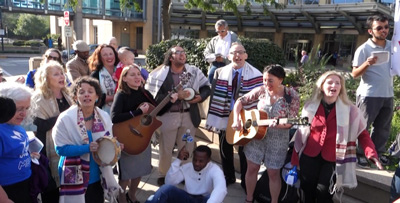Singing for a South Side trauma center
Permanent link
At the synagogue where I grew up – Congregation B’nai Amoona in St. Louis – I heard Debbie Friedman’s “Mi Sheberach” often.
“Bless those inneed of healing with r'fuah sh'leimah, the renewal of body, the renewal ofspirit…"
That song took on deeper meaning for me when I heard it sung recently by a group of Chicago cantors, and not within the walls of any synagogue.
I recently began a year-long assignment as a new Organizing Fellow with the Jewish Council on Urban Affairs. I’m working with JCUA this year while serving as a corps member with AVODAH: The Jewish Service Corps. Living with 15 housemates in a house known as the Bayit in Lakeview, all of us work at poverty-focused non-profits while receiving mentoring, education and training on social justice, Judaism, poverty in Chicago and non-profit careers.
As a newcomer to Chicago, I was only aware – on a surface level – of the division between the North and South sides. But as I began my work for JCUA on a campaign to help establish a level one trauma center to the South Side of Chicago, I discovered how stark the contrast is between these parts of the city.
Last year, Chicago was ranked as the seventh most racially segregated city in the United States, and of the eight level one trauma centers in Chicago, none is on the South Side. Many people have been shot on the South Side, only to die in ambulance rides to distant trauma centers on the North and West sides. In fact, if you are shot and travel more than five miles to receive emergency care at a trauma center, you are 23 percent more likely to die.
For these reasons, more than 50 community members from JCUA, Students for Health Equity, Fearless Leading by the Youth from STOP Chicago, Kenwood United Church of Christ, St. Phillip Lutheran Church, Park Manor Christian Church, and Trinity United Church of Christ, gathered outside of the University of Chicago Duchossois Center for Advanced Medicine on Thursday, Sept. 18 to “Sing for a Trauma Center.”
This is where I heard “Mi Sheberach” in a context I never had before – to emphasize the need for healing in the greater community. Song leaders included Cantor Vicky Glikin from Congregation Solel, Cantor Faryn Rudnick from Congregation Beth El, Cantorial Soloist Heather Aranyi from Har-Shalom Synagogue, Rabbi Lizzi Heydemann, Cantor Michael Davis from Lakeside Congregation, Cantor David Berger from KAM Isaiah Israel Congregation, and Cantorial Soloist Debby Lewis. I’m sure that people several blocks away could hear the Jewish song leaders and community members joining in “We Shall Overcome.”
It is our duty as Jewish people to combat systemic racism. In Leviticus, God commands to “not stand idly by when your neighbor bleeds” (19:16). Pirkei Avot teaches “You are not expected to complete the task, but neither are you free to avoid it.”
The interconnectedness between gun violence, racism, healthcare, education and so many other problems in Chicago is so complex that it will take a long time to overcome them all. Yet we can definitely work to solve a significant portion of this web in advocating for the opening of a level one adult trauma center to serve the South Side.
We all have a stake in this, as Chicagoans and as Jews.
Nate Seeskin is acurrent Chicago corps member of AVODAH: The Jewish Service Corps working withthe Jewish Council on Urban Affairs.



.jpg)



